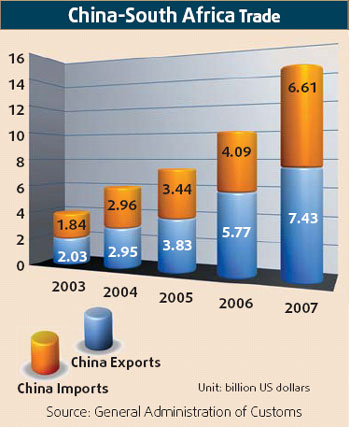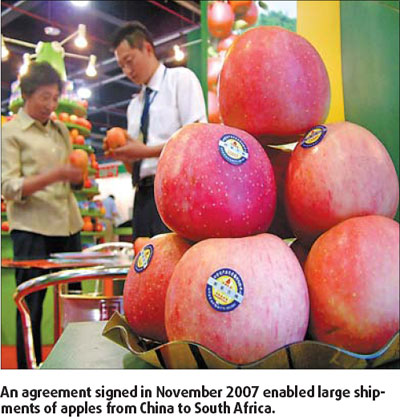China and South Africa further strengthen ties
This year marks the 10th anniversary of the establishment of diplomatic relations between South Africa and China. Over the decade, trade relations between the two countries have developed steadily. Kobus van der Wath, business director of the South Africa-China Business Association (SACBA), spoke about recent trends in bilateral ties in a recent interview wtih China Daily.
He began with recounting the history of the chamber, which has now completed five years. When it was first set up, there were very few South African companies doing business in or with China. But the last five years have changed that.

"We have many companies in the business community. Some are big and famous and some smaller companies. Some of them have helped other companies find their niche and tap the market and networks. Although our chamber is a small business association compared to the American or British chambers, it contributed a lot to introducing these companies to China for creating information flow and network development. That is a very important role in the situation," said Van der Wath.
He noted that South Africa and China have very different ways of doing business.
"You really do not know where to start as a Chinese person going to South Africa for the first time, or as a business person coming to China, which is where the chamber has a key role to play."
The 10-year anniversary marks an important milestone for both South Africa and SACBA, which will organize more formal events and activities, and play a more active role in boosting the overall bilateral business relationship.
Van der Wath highlighted the chamber's behind-the-scenes role in providing information, and in facilitating and creating more clarity in dealings.
There are close to 30 South African companies in Beijing, with some others scattered around the country. They play a significant role back home in South Africa and also in the global industry. The chamber has both members and associate members, with the latter being higher in number. They do not have offices in China, but they visit often and what they really do is to provide information. On the membership side, it is a small group but the network is very significant, the SACBA director pointed out.
The chamber is also ready to offer its services to Chinese companies desirous of investing in South Africa.
"In the past, we started slowly as a small chamber. There were not that many activities. One of our goals for 2008 is to make the chamber more formal, more active and more significant," said Van der Wath.
The chamber will organize a large business seminar this year, to be conducted in Chinese and aimed at creating opportunities for Chinese business people in South Africa and vice versa.

The seminar is likely to take place in the second quarter and Van der Wath hopes big Chinese companies will do business in South Africa and share their experiences with others trying to go to South Africa. South African companies in China will also share their experience of operating in an alien culture.
Talking about the bilateral investment situation, Van der Wath says South Africa has made considerable direct investment in China, even as China increases its business in his home country.
However, he expressed his hope that China will make more direct investments in his country, which will help create more jobs.
Van der Wath emphasized that the two countries and their business communities are getting to know and understand each other better. "Ten years ago, China was new to us. We are happy to see that the situation of the relationship is changing."
China has invested in mining and energy resources, both major sectors in South Africa, as also in the construction and manufacturing industries.
Van der Wath expresseed confidence in the competitiveness and investment climate of the Chinese mainland.
The Chinese economy is growing fast and the economic structure is being managed well by State planners and policy makers, he pointed out.
South Africa has a positive view of China's prospects in the medium and long term, and the chamber is looking at the country very strategically in the long term. "Overall, our thinking is that China is an important market and you must be here. There's no doubt."
Van der Wath thought that South African companies have derived a wide range of benefits from China. "The consumer market is growing. We have people and companies here doing business and selling products in the industrial sector."
"We see China as a very comprehensive opportunity. It is so big. In the service industry, this is very interesting for people living in China because China offers so many opportunities," he said.
Van der Wath feels South Africa's energy sector has very sophisticated technology although it does not have very high reserves of oil and gas.
There are some sectors in which South Africa is ahead of China, like transportation, telecommunications, environmental protection and health care, he noted.
"We are a smaller country but we still have basic problems. China has got too many people and too much land, which is a very complicated situation."
The two countries must create knowledge, understanding, friendship, exchange, joint research programs, academic exchanges, scholarships and joint commissions of big firms in top areas like energy, resources, infrastructure, finance and health care. This is how the two sides may find each other very useful as long-term partners, Van der Wath suggested.
On the other hand, although South Africa is ahead of China in many aspects, in some ways, China is so far ahead of everybody because of its sheer scale. Therefore, China also has a lot to offer South Africa, creating a favorable situation for mutual cooperation, he said.
In telecommunications, for instance, South Africa has some demanding users and sophisticated technology. But China has very good telecommunication equipment. So the two countries can cooperate and learn from each other in such fields.

Van der Wath said the attitude of the two countries is very important. South Africa regards China as a serious player in Africa, which is a valuable asset.
"South Africa has more resources than China can get elsewhere. The biggest relationship at the moment is that we buy a lot of manufactured goods from China and China buys a lot of energy resources from us. That's the fundamentals of the relationship," he noted.
South Africa has a sizeable population and a diversified economy, translating into a lot of opportunities. If Chinese companies want to invest in South Africa, they should keep an open mind, know where their opportunities lie, and plan right.
The chamber director tought South Africa offers Chinese companies a lot of opportunities in mining, processing of resources, manufacturing, heavy and light industries, IT, logistics, and so on.
The chamber provides information and network support to South African companies wishing to invest in China, apart from advising them on the legal requirements of doing business here. He says the chamber will do the same for Chinese companies keen on setting up shop in South Africa.
The 2008 Olympics in Beijing and the 2010 World Expo in Shanghai will provide lots of business opportunities for South Africa, Van der Wath noted.
However, he added: "These events are important for us and for everybody. But we are far more interested in long-term and ongoing activities."
South Africa is one of the 170 countries that will take part in the Shanghai World Expo, and the chamber will assist the exhibitors in every way, Van er Wath pledged.
On the other hand, South Africa will host the 2010 Football World Cup. The chamber will be active in introducing Chinese companies to do related project work in his country, he said.
There are many Chinese firms involved in construction, glass-making, construction materials, design and other fields that have already invested in South Africa.
In order to push bilateral relations to a new high, Van der Wath said both countries need to understand they can probably source more products and services from the other.
South Africa must realize China has a lot more than it can buy, with the same quality and same speed of production but at a lower price.
At the same time, the Chinese must realize that South Africa has a large store of industrial, consumer and food products, as well as wine and energy resources.
(China Daily 04/24/2008 page18)














